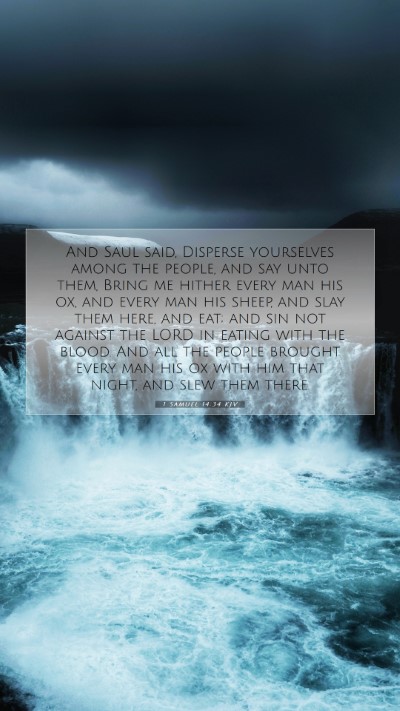1 Samuel 14:34 - Understanding the Verse
Verse: "And Saul said, Disperse yourselves among the people, and say unto them, Bring me hither every man his ox, and every man his sheep, and slay them here, and eat; and sin not against the Lord in eating with the blood. And all the people brought every man his ox with him that night, and slew them there." (1 Samuel 14:34, KJV)
Overall Meaning and Context
This verse captures a moment in the life of Saul, the first king of Israel, during a critical episode of battle against the Philistines. After a victory, Saul's rash vow led to a troubling situation regarding consumption of blood, which was prohibited by the Law. This moment illustrates both Saul’s leadership and the importance of adherence to God's commands.
Commentary Insights
-
Matthew Henry:
Henry emphasizes that Saul's command arises from a desire to maintain accountability following a hasty oath he had made during battle, which inadvertently troubled his men. He points out the significance of eating without consuming blood, reflecting the Israelites' understanding of religious and dietary laws stemming from Leviticus and the principle behind God's commandments for Israel.
-
Albert Barnes:
Barnes notes that this event illustrates the strength of obedience to God's laws regarding the blood. He explains that sacrificial animals were to be offered properly, and blood was not to be consumed under any circumstances. Barnes highlights that Saul's impulsive leadership style led to a necessary corrective action to restore proper order in the aftermath of the battle.
-
Adam Clarke:
Clarke elaborates on the ceremonial aspects of the Jewish dietary laws and connects them to Saul’s directive that the people bring their animals to be slaughtered and eaten in the correct manner. He indicates that not only does this speak to Saul's temporary authority but also underscores the seriousness with which the Israelites took God's commands, even amidst the chaos of war.
Key Themes and Lessons
-
Leadership Accountability:
This verse highlights the responsibilities that come with leadership. Saul’s hasty vow put his men in a difficult position, demonstrating that leaders must carefully consider their words and actions.
-
Obedience to Divine Law:
The reference to blood represents God’s covenant with His people about life and death, which emphasizes the sacredness of life as signified by the blood. Saul’s command to avoid eating blood illustrates the importance of adhering to God’s laws.
-
The Importance of Community:
The action taken by the people of Israel shows a communal effort to ensure compliance with divine law. The collective decision reflects unity and responsibility to uphold God's statutes.
Historical Context and Application
The historical context of this verse is during the period of Israel's monarchy, a time fraught with challenges from surrounding nations. Understanding the pressures Saul faced at that time adds depth to his actions. This verse serves as a reminder for modern readers about the significance of lawfulness and the communal aspects of faith practice.
Cross References
- Leviticus 17:10-14: Discusses laws regarding the consumption of blood.
- Genesis 9:4: States the prohibition against consuming blood, linking it to the sanctity of life.
- 1 Samuel 14:33: Earlier in the chapter, the issue of eating with blood is directly raised.
- Deuteronomy 12:23-25: Emphasizes the importance of avoiding blood in consumption.
Conclusion
In conclusion, 1 Samuel 14:34 serves as a powerful reminder of the importance of adhering to God's laws and the responsibilities that leaders bear in guiding their communities. By studying this verse, we gain insights into both the historical context of Israel and the continuous relevance of God's commandments in our lives today.


